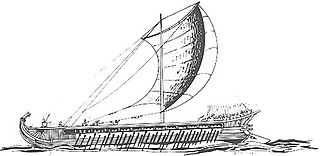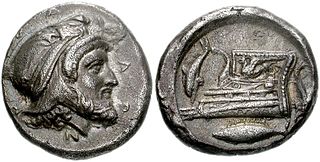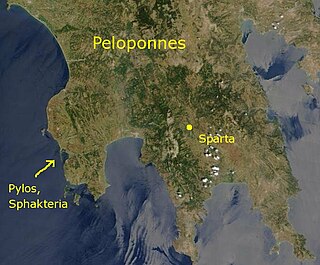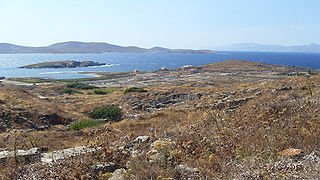 W
WThe Battle of Amorgos was one of the naval battles of the Lamian War, fought between the Macedonian navy under Cleitus the White and the Athenian navy under Euetion. Although few details are known, it was a clear Athenian defeat, although the Athenians seem to have suffered few losses. Regarded as the decisive naval battle of the war, it signalled the end of Athenian thalassocracy and political independence.
 W
WThe naval Battle of Arginusae took place in 406 BC during the Peloponnesian War near the city of Canae in the Arginusae islands, east of the island of Lesbos. In the battle, an Athenian fleet commanded by eight strategoi defeated a Spartan fleet under Callicratidas. The battle was precipitated by a Spartan victory which led to the Athenian fleet under Conon being blockaded at Mytilene; to relieve Conon, the Athenians assembled a scratch force composed largely of newly constructed ships manned by inexperienced crews. This inexperienced fleet was thus tactically inferior to the Spartans, but its commanders were able to circumvent this problem by employing new and unorthodox tactics, which allowed the Athenians to secure a dramatic and unexpected victory. Slaves and metics who participated in the battle were granted Athenian citizenship.
 W
WThe Battle of Aegospotami was a naval confrontation that took place in 405 BC and was the last major battle of the Peloponnesian War. In the battle, a Spartan fleet under Lysander destroyed the Athenian navy. This effectively ended the war, since Athens could not import grain or communicate with its empire without control of the sea.
 W
WThe Battle of Artemisium, or Battle of Artemision, was a series of naval engagements over three days during the second Persian invasion of Greece. The battle took place simultaneously with the land battle at Thermopylae, in August or September 480 BC, off the coast of Euboea and was fought between an alliance of Greek city-states, including Sparta, Athens, Corinth and others, and the Persian Empire of Xerxes I.
 W
WThe Battle of Cnidus was a military operation conducted in 394 BC by the Achaemenid Empire against the Spartan naval fleet during the Corinthian War. A fleet under the joint command of Pharnabazus and former Athenian admiral, Conon, destroyed the Spartan fleet led by the inexperienced Peisander, ending Sparta's brief bid for naval supremacy.
 W
WThe naval Battle of Cynossema took place in 411 BC during the Second Peloponnesian War. In the battle, an Athenian fleet commanded by Thrasybulus and Thrasyllus, although initially thrown on the defensive by a numerically superior Spartan fleet, won a narrow victory. This victory had an impact out of proportion to its tactical significance, coming when Athens' traditional democratic government had been replaced by an oligarchy and an Athenian defeat could have ended the war. The newly confident Athenian fleet proceeded to win two more victories in the Hellespont in quick succession, the second being the dramatic rout at Cyzicus, which ended the immediate Spartan threat to Athens' Black Sea lifeline.
 W
WThe naval Battle of Cyzicus took place in May or June 410 BC during the Peloponnesian War. In the battle, an Athenian fleet commanded by Alcibiades, Thrasybulus, and Theramenes routed and completely destroyed a Spartan fleet commanded by Mindarus. The victory allowed Athens to recover control over a number of cities in the Hellespont over the next year. In the wake of their defeat, the Spartans made a peace offer, which the Athenians rejected.
 W
WThe Battle of the Eurymedon was a double battle, taking place both on water and land, between the Delian League of Athens and her Allies, and the Persian Empire of Xerxes I. It took place in either 469 or 466 BCE, in the vicinity of the mouth of the Eurymedon River in Pamphylia, Asia Minor. It forms part of the Wars of the Delian League, itself part of the larger Greco-Persian Wars.
 W
WThe Battle of Naupactus was a naval battle in the Peloponnesian War. The battle, which took place a week after the Athenian victory at Rhium, set an Athenian fleet of twenty ships, commanded by Phormio, against a Peloponnesian fleet of seventy-seven ships, commanded by Cnemus.
 W
WAt the Battle of Naxos the new Athenian fleet of Chabrias decisively defeated the Spartans. This was the beginning of Athens's recovery of its Aegean hegemony following its loss in the Peloponnesian War. The victory was decided by Phocion's courageous and skillful action on the left wing. In western waters another great Athenian commander, Timotheus, won the battle of Alyzia against Sparta in 374 BC.
 W
WThe Battle of Notium in 406 BC, was a Spartan naval victory in the Peloponnesian War. Prior to the battle, the Athenian commander, Alcibiades, left his helmsman, Antiochus, in command of the Athenian fleet, which was blockading the Spartan fleet in Ephesus. In violation of his orders, Antiochus attempted to draw the Spartans into battle by tempting them with a small decoy force. His strategy backfired, and the Spartans under Lysander scored a small but symbolically significant victory over the Athenian fleet. This victory resulted in the downfall of Alcibiades, and established Lysander as a commander who could defeat the Athenians at sea.
 W
WThe naval Battle of Pylos took place in 425 BC during the Peloponnesian War at the peninsula of Pylos, on the present-day Bay of Navarino in Messenia, and was an Athenian victory over Sparta. An Athenian fleet had been driven ashore at Pylos by a storm, and, at the instigation of Demosthenes, the Athenian soldiers fortified the peninsula, and a small force was left there when the fleet departed again. The establishment of an Athenian garrison in Spartan territory frightened the Spartan leadership, and the Spartan army, which had been ravaging Attica under the command of Agis, ended their expedition and marched home, while the Spartan fleet at Corcyra sailed to Pylos.
 W
WThe Battle of Salamis was a naval battle fought between an alliance of Greek city-states under Themistocles, and the Persian Empire under King Xerxes in 480 BC. It resulted in a decisive victory for the outnumbered Greeks. The battle was fought in the straits between the mainland and Salamis, an island in the Saronic Gulf near Athens, and marked the high point of the second Persian invasion of Greece.
 W
WThe naval Battle of Salamis in 306 BC took place off Salamis, Cyprus between the fleets of Ptolemy I of Egypt and Antigonus I Monophthalmus, two of the Diadochi, the generals who, after the death of Alexander the Great, fought each other for control of his empire.
 W
WThe Wars of the Delian League were a series of campaigns fought between the Delian League of Athens and her allies, and the Achaemenid Empire of Persia. These conflicts represent a continuation of the Greco-Persian Wars, after the Ionian Revolt and the first and second Persian invasions of Greece.